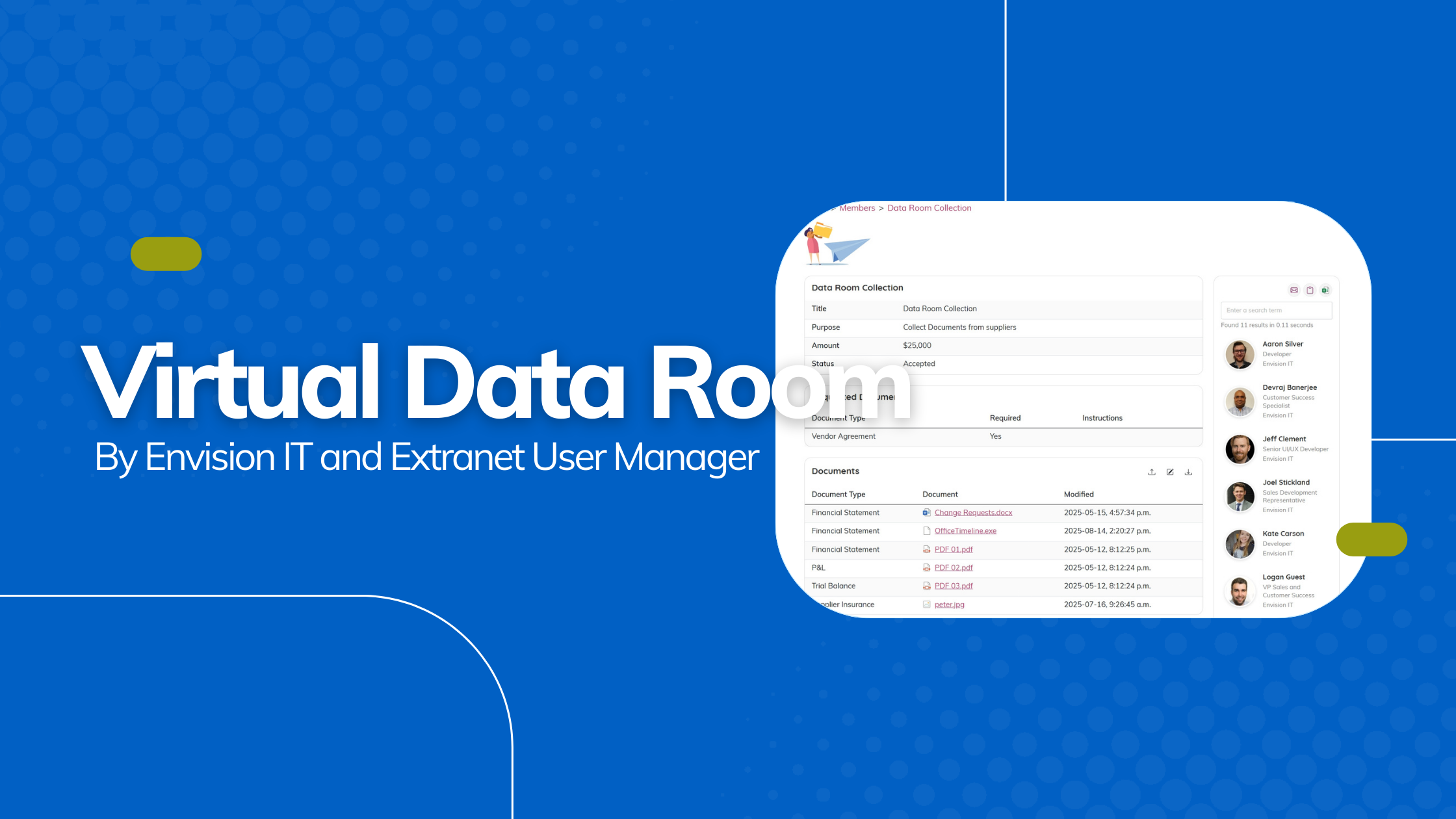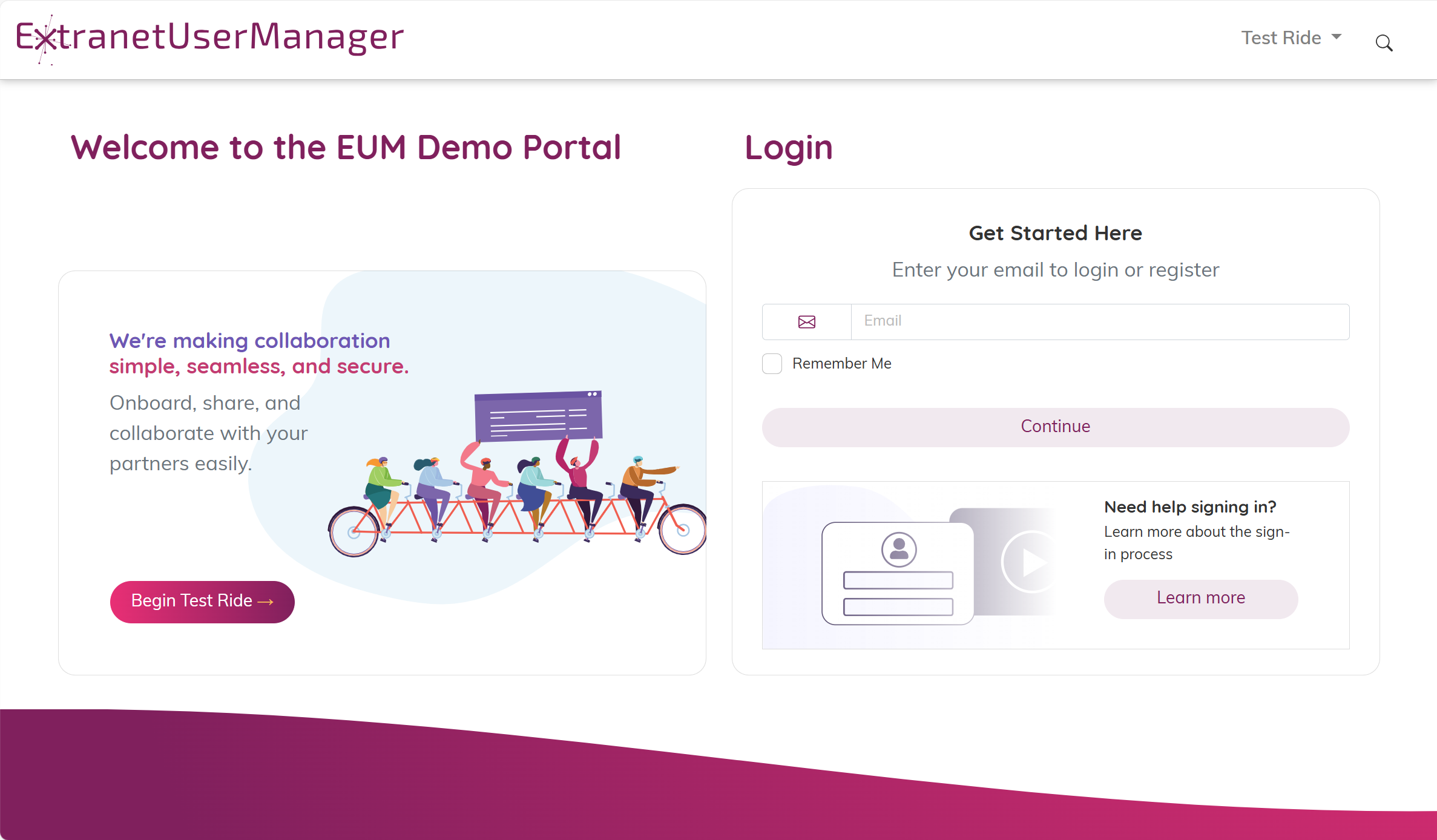Virtual Data Rooms for Law Firms: Organizing and Sharing Files Securely

Managing sensitive information during due diligence is the biggest challenge faced by law firms. Indeed, legal teams handle large amounts of confidential information, making secure storage, controlled sharing, and compliance vital for maintaining confidentiality and ensuring data integrity.
That’s where legal data rooms come into play, providing a reliable solution that goes beyond simple document storage. These platforms are transforming the way legal teams collaborate, manage information, and comply with stringent regulatory requirements.
With so many virtual data room providers available, choosing the right one for your law firm can be difficult. Many VDRs offer extensive features, but the user experience may fall short. For legal firms using Microsoft 365, operating the data room within Microsoft 365, combined with a simpler interface, creates secure, compliant and smart workspaces for due diligence, litigation, minute books, and board portals that match your existing identities, devices, and workflows.
Continue reading to discover how legal teams are utilizing Microsoft 365 to establish a next-generation data room that simplifies external collaboration, ensures data integrity and security, and delights their clients, all without disrupting their daily workflows.

What is a legal virtual data room in Microsoft 365?
A virtual data room (VDR) is an online, secure storage space that allows law firms to store, organize, and share sensitive case files with relevant parties. They have become indispensable for modern legal firms, offering a convenient way to manage and share confidential data.
Unlike regular file sharing cloud platforms like OneDrive or Google Drive, these rooms offer advanced features designed for legal workflows, such as:
Advanced security protocols
The enterprise-grade security stack integrated into the Microsoft 365-based virtual data room supports data encryption at rest and in transit, two-factor authentication (MFA), permission control, conditional access, intrusion detection, and comprehensive audit trails.
Compliance continuity
With a unified approach to policies, audits, holds, and retention across the entire matter lifecycle, there's no need to translate policies to a separate platform. VDRs help law firms stay compliant with industry regulations by providing secure, trackable document management systems that meet strict legal standards.
Efficient document management
VDRs centralize and streamline document sharing, storage, and management in SharePoint Online, including versioning, metadata, Q&A, and permission control, to save time and reduce administrative workload.
Seamless external collaboration
These data rooms facilitate secure real-time collaboration among multiple stakeholders. A streamlined, branded interface makes it easy for clients and counterparties to upload files, view outstanding tasks, and receive read-only distributions when appropriate, without needing to learn a new system.
Tailored to legal workflows
Today's legal data rooms feature prebuilt templates for common scenarios, such as due diligence, litigation records, minute books, and board materials. With automation, law firms can quickly establish new data rooms using these templates, ensuring consistency, reducing administrative tasks, and streamlining the onboarding process. Permissions, retention policies, and branding are applied automatically, allowing legal teams to focus on their casework rather than setting up workspaces.
Keep reading: What is a virtual data room and why do you need one?

How do lawyers use legal data rooms?
Legal data rooms support a range of high-stakes workflows where confidentiality, control, and an auditable record are non-negotiable, such as:
Legal Extranet / Client Portal
A secure platform for exchanging documents, tracking requests, and viewing case statuses. Role-based views display only the information needed by each participant. All activity is logged for a comprehensive audit trail.
Litigation
Organize pleadings, evidence, transcripts, and expert materials with least privilege access (e.g., view-only for experts, no downloads for sensitive items). Ensure immutable versions, retention policies, and legal holds are maintained throughout the content’s lifecycle.
Legal due diligence
Conduct buy-side or sell-side due diligence with clear folder indices, request and upload checklists, detailed party separation, change highlights, and exportable audit logs.
Protected document storage
Maintain a single source of truth for privileged agreements, productions, and sensitive correspondence, with governed retention, versioning, and granular permissions for redacted versus original files.
Mergers & acquisitions (M&A)
Configure complex deal rooms with detailed permissions, phased disclosures, monitored bidder activity, and time-limited access. Close with a comprehensive activity report and enforce retention policies on the final archive.
Public finance & regulatory matters
Controlled distribution of disclosures and supporting materials with read-only access, tracked acknowledgments, and regulator-ready reporting.
Intellectual property law
Protect patent filings, trade secrets, and licensing agreements by enforcing a need-to-know access policy and keeping detailed logs of all access. Share redacted drawings or agreements with selected parties while ensuring secure document access, to maintain a clear record of how the IP was managed.
Corporate minute books & board Materials
Provide directors with a secure portal for board packages, resolutions, and minute books, accessible from anywhere. Read-only access to pre-reads, clear revision history, and governed retention of corporate records ensure long-term compliance.
How do virtual data rooms benefit legal firms?
Lawyers handling complex files and documents for their clients are no strangers to the challenges of securing, collaborating on, and organizing documents in a way that protects the integrity and success of the transaction while maintaining confidentiality and compliance standards. Here’s how lawyers benefit from legal data rooms:
- Security: Access is limited to authorized users; detailed and granular permissions and MFA ensure secure login and account access.
- ‘Always-on’ collaboration tools: Work globally, 24/7, with anyone worldwide, without geographic limits or physical rooms.
- Cost savings: Reduce costs associated with travel, rentals, and printing for physical data rooms, and minimize renegotiations resulting from security incidents, including cyber threats or a security breach.
- Client experience and competitive advantage: Clients anticipate modern, secure, and simple collaboration. Modern and efficient VDRs set your firm apart and provide a superior virtual client experience.
Click here to explore the benefits of virtual data rooms in more detail.
Why lawyers should adopt Microsoft 365 for secure client document management
Until recently, the legal sector was slow to adopt new technology; however, increased cyber threats, changing client expectations, and the growth of Microsoft's ecosystem have shifted this perspective.
Microsoft 365 is a reliable, scalable platform used by over 300 million commercial users. Its security features, ROI, and familiarity make it an ideal solution for legal professionals wanting a simple and secure way to collaborate with external parties.
Extranet User Manager Data Room for legal professionals builds on this foundation to deliver a VDR that is:
- Simple: Designed for legal workflows with a radically simplified UI.
- Secure: Leveraging Microsoft’s top-tier identity and built-in identity protection.
- Scalable: Supporting complex transactions like mergers and acquisitions with delegated user management.
- Integrated: Using Word, Excel, and Teams to bridge the tech gap with clients and their internal team.
There has never been a more critical time for lawyers to manage risk, maintain security and confidentiality, simplify collaboration and version control, and keep an audit trail while bridging the technological gap. By leveraging the full potential of Microsoft, the Extranet User Manager Data Room for lawyers enables them to do so effortlessly.
Click here to see why lawyers should adopt Microsoft 365 for secure client document management.

The 5 Must-Have Features of Microsoft 365-Powered Legal Data Room
When law firms evaluate virtual data rooms, the discussion often focuses on security, compliance, and usability. However, the real question is: which capabilities are truly essential for legal workflows? Drawing on industry best practices and our experience with leading firms, these five features are non-negotiable and demonstrate how a Microsoft 365-powered legal data room, such as Extranet User Manager, provides them.
1. Enterprise-grade security without compromising identity strategy
Security is the top priority for any legal VDR. Sensitive client data, privileged communications, and deal documents require airtight protection. While Microsoft 365 already offers strong security, managing external access can be complex.
That’s where the Extranet User Manager comes in. It uses Microsoft Entra ID External Identities to securely authenticate external users with their own credentials. This approach minimises governance risks and licensing costs while maintaining a unified identity model.
Key security features:
- End-to-end data encryption for data both in transit and at rest
- Multi-factor authentication for all users
- Granular access controls to specify who can view, download, or edit documents
- Comprehensive audit logs to record every user action
- Immediate access revocation for compromised accounts
- IP-based restrictions to enhance location-based security
Why it matters for law firms: Protect attorney‑client privilege, uphold ethical responsibilities, and collaborate confidently with clients and co‑counsel globally.
2. Permissions Management and Delegated Admin
Legal matters often involve multiple parties, including clients, co-counsel, experts, and regulators, each requiring different levels of access. Traditional VDRs typically require IT to manage user permissions, which can lead to workflow bottlenecks. EUM changes this with delegated administration, allowing legal teams to control access directly through user-friendly dashboards [LG1] [LG2] and by following the foundation IT has implemented, thereby eliminating sprawl or a permission mess down the line.
Key access control features:
- Role-based access controls for partners, associates, paralegals, and clients
- Document sharing level permissions for sensitive materials
- Delegated administration so legal teams can manage users directly
- Robust permissions management and control with Microsoft Purview
Why it matters: Maintain confidentiality, reduce IT overhead, and provide audit-ready evidence of proper access controls.
3. Advanced document management and search capabilities
Managing thousands of confidential documents across multiple matters is a logistical challenge. EUM enhances SharePoint Online with VDR-specific features to ensure efficiency and accuracy.
Key document management features:
-
Version control and immutable history for a single source of truth
-
Bulk upload/download for large data sets
-
Metadata tagging and indexing for intuitive navigation
-
AI‑powered search via Azure AI for contextual results
-
Watermarking capabilities to protect sensitive information when sharing confidential documents
Why it matters: Speed up the due diligence process, reduce time spent searching for documents, and eliminate file duplication and file storage costs.
4. Seamless collaboration with Microsoft 365 tools
Lawyers don’t merely share files; they work together on them. EUM integrates VDR functionality into Teams, SharePoint, and Outlook, allowing lawyers and clients to work within familiar tools without needing to switch platforms.
Key collaboration features:
-
Real‑time coauthoring in Word, Excel, and PowerPoint
-
Secure commenting and annotation with audit logging
-
Q&A modules for structured communication
-
Task management to assign and track responsibilities
-
Multilingual interface for global legal teams
- Mobile app and desktop access
Why it matters: Reduces miscommunication, maintains version control, and keeps workflows secure and efficient.
5. Intuitive User Experience and Scalable Administration
With a VDR, you shouldn't feel like you're working against your legal workflow; it should be a seamless part of it. EUM provides a Microsoft 365-aligned interface, branded portals, and self-service onboarding to make it easy for clients and counterparties to adopt and collaborate with you.
Key UX and admin features:
-
Responsive front‑end integrated with Teams and SharePoint
-
Self‑service registration and password resets
- Single sign-on using your own credentials
-
Role‑based dashboards for customized views
-
Real‑time notifications and activity feeds
-
Reusable workspace templates for M&A transactions, board meetings, and client onboarding
-
Power BI dashboards for actionable insights and compliance reporting
-
Custom branding for a unique, on-brand portal experience
Why it matters: Simplify onboarding, reduce IT reliance, and enhance visibility into usage, risks, and compliance status.
Keep reading: How to Choose the Best Virtual Data Room Provider

Extranet User Manager: Microsoft 365-Powered Virtual Data Room for Law Firms
Extranet User Manager Data Room is a secure VDR designed for law firms and legal professionals. It extends Microsoft 365 to enable simple, scalable, and compliant client collaboration. Essentially, Extranet User Manager acts as a layer that converts Microsoft 365 into a tailored legal collaboration platform.
Here’s how:
- Security & governance: Built on Microsoft Entra ID External Identities, EUM guarantees secure user authentication, IP restrictions, and immediate access revocation, all supported by Microsoft’s enterprise security infrastructure.
- Workflow optimization: Pre-built templates for due diligence, litigation records, and board portals speed up setup while promoting best practices.
- Collaboration in context: Deep integration with Teams and SharePoint adds Q&A, tasking, and structured communication within familiar tools.
- Compliance & insight: Power BI dashboards and exportable reports offer complete visibility into user activity, license usage, and security posture.
Click here to learn more about how Extranet User Manager makes Microsoft Simple.
Conclusion
The legal industry is facing increasing pressure to reduce risk, enhance the client experience, and manage costs effectively. A standalone VDR can address some needs, but it introduces another identity system, additional policies, and another interface for your teams and clients to learn. A Microsoft 365-native VDR consolidates everything into one platform: one directory, one compliance framework, one workspace.
The Extranet User Manager’s Legal Data Room provides a strong foundation that develops into a fully compliant legal-grade solution, offering streamlined external onboarding, delegated administration, and a user-friendly, branded portal. This setup improves security without creating friction, giving lawyers and their clients confidence and peace of mind with every transaction.
Ready to see the difference?
Schedule a personalized demo today and discover how EUM can improve your legal operations and transform your client collaboration experience.